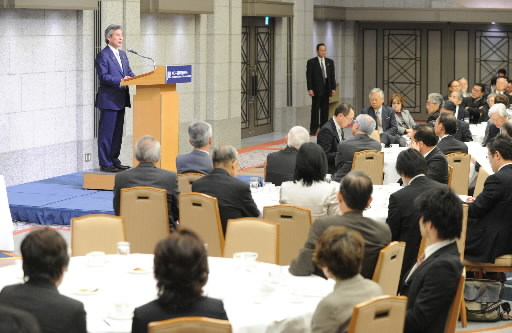Nuclear weapons can be eliminated: Chapter 6, Part 3
Jul. 28, 2009
Chapter 6: Instability in Northeast Asia
Part 3: Government of Japan
by Yumi Kanazaki and Kohei Okata, Staff Writers
Insistence on maintaining deterrence
On April 27, three weeks after U.S. President Barack Obama delivered a speech in Prague in which he called for a world without nuclear weapons, Foreign Minister Hirofumi Nakasone gave a speech in Tokyo titled “Conditions Towards Zero: 11 Benchmarks for Global Nuclear Disarmament.”
In his remarks he said, “I believe it is Japan’s mission to convey to all people around the world the facts of the calamity of the nuclear bombings that occurred in August 1945 in Hiroshima and Nagasaki, across the boundaries of various political viewpoints and ideologies.”
In his speech Mr. Obama had said that “as the only nuclear power to have used a nuclear weapon, the United States has a moral responsibility to act.” In response, Mr. Nakasone referred to “Japan’s mission as the victim of atomic bombings.” Among his “11 Benchmarks for Global Nuclear Disarmament” he urged China to eliminate their nuclear arms and addressed the need for restrictions on ballistic missiles.
But he broke little new ground and Terumi Tanaka, 77, secretary-general of the Japan Confederation of A- and H-Bomb Sufferers Organization, was unmoved. “I give him credit for once again declaring Japan’s intention to work toward nuclear abolition,” he said. On the other hand, some were puzzled by this statement from Mr. Nakasone: “In light of the situation in East Asia, it goes without saying that the extended deterrent, including nuclear deterrence, under the Japan-U.S. security arrangement is of critical importance for Japan.”
Japan has been criticized for its double standard under which it calls for nuclear abolition while at the same time depending on the U.S. nuclear umbrella for its security. Hiroshi Takakusaki, 65, general secretary of the Japan Council against Atomic and Hydrogen Bombs, described the international community’s view of the double standard. “Every country is aware of it,” he said. “They are not under any illusion.”
Every year since 1994, Japan has submitted a resolution to the General Assembly of the United Nations calling for nuclear abolition. Although the U.S. has opposed the resolution since the formation of the administration of President George W. Bush in 2001, it has always passed with an overall majority. “The resolution is merely mentioning the measures that have earned a certain amount of recognition,” Mr. Takakusaki said. “Japan just says something slightly different from what the U.S. says so as not to have any effect on the nuclear umbrella.”
One month later, on May 27 at a university in Tokyo, Gareth Evans, former foreign minister of Australia, addressed an audience consisting of 30 members of groups concerned with nuclear disarmament and experts on the subject.
“Japan seems to love nuclear weapons,” Mr. Evans said, “because you think the nuclear umbrella is necessary to prevent attacks using chemical, biological and conventional weapons too.”
In preparation for next spring’s review conference for the Nuclear Non-proliferation Treaty (NPT), the International Commission on Nuclear Non-proliferation and Disarmament (ICNND) plans to prepare a paper on this subject. Mr. Evans serves as co-chair of the organization along with Yoriko Kawaguchi, former foreign minister of Japan. Mr. Evans is clearly annoyed by Japan’s stance, which may hinder efforts toward nuclear disarmament.
Yasunari Morino, 44, director of the Arms Control and Disarmament Division of the Ministry of Foreign Affairs, said flatly, “Japan must take a practical course that balances the abolition of nuclear weapons with its security. There is nothing contradictory about asserting the need for nuclear deterrence.”
Japan has been unsettled by recent news regarding the existence of a secret agreement between Japan and the U.S. allowing the U.S. to introduce nuclear weapons into the country aboard its ships. If nuclear deterrence is necessary, won’t the three non-nuclear principles, which constitute national policy, ring hollow?
(Originally published on July 13, 2009)
To comment on this article, please click the link below. Comments will be moderated and posted in a timely fashion. Comments may also appear in the Chugoku Shimbun newspaper.








